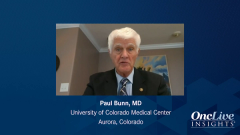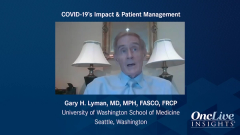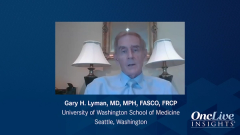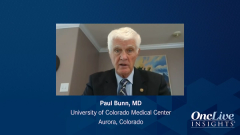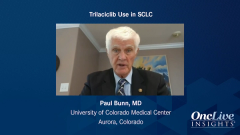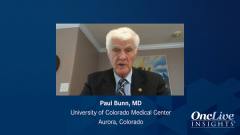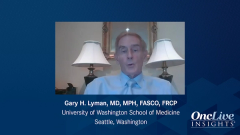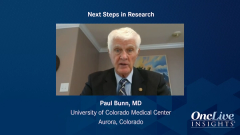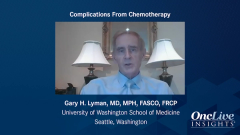
CDK4/6 Inhibitors & Myelopreservation in Other Cancers
Episodes in this series

Paul Bunn, MD: As I mentioned, chemotherapy is the mainstay of treatment in many cancers, including almost all solid and liquid tumors. Myelopreservation is important for all these tumors. One of the questions is, would it interfere with antitumor effects? This is not an issue in small cell lung cancer because they all have Rb [retinoblastoma protein] loss. But for many cancers in which there’s myelosuppression, you don’t have Rb loss. The question is whether trilaciclib could interfere with an antitumor effect in other settings where there’s not Rb loss. In fact, the clinical data suggest that’s not going to happen, presumably because cell cycle control is modulated by many proteins besides phospho-Rb [phosphorylated-Rb] and other cyclin-dependent kinases. It’s reasonable to study this in many cancers. The data, to date, have been primarily in breast cancer. In breast cancer, there are data to suggest antitumor and myelopreventive effects from trilaciclib. There are many ongoing trials—and there will likely be more—in diseases other than breast cancer, in which chemotherapy is the backbone. The future will extend beyond small cell lung cancer. Undoubtedly, non–small cell lung cancer will have some trials and breast cancer will have more trials, as will other solid and liquid tumors. We need data.
Gary H. Lyman, MD, MPH, FASCO, FRCP: As I mentioned, there are trials underway to look at the impact of trilaciclib in cancer settings beyond small cell lung cancer. We anticipate that there might be ability to enhance chemotherapy delivery, as well as reduce the myelosuppression associated with cytotoxic chemotherapy. But there’s also the potential for an impact on the immune system. In a recent trial that was published in The Lancet, which was a phase 2 trial of trilaciclib in patients with triple-negative breast cancer receiving conventional chemotherapy, trilaciclib did not show the same level of effect on myelosuppression. There was some, but it was not statistically significant.
However, in the secondary end points of this study, it was quite intriguing that there was a significant improvement in overall survival. There was a hazard ratio of 0.4, and highly significant reduction in mortality in patients receiving trilaciclib prior to their chemotherapy in triple-negative breast cancer. This was a phase 2 study that was relatively small and still needs to be confirmed.
The reasoning here is also under investigation. If the improvement in survival was not a result of reducing complications, it leaves the possibility that in some cases, there may have been more chemotherapy delivered, because there was some reduction in neutropenia, anemia, and so forth.
Perhaps more intriguing is the impact on the immune system. Again, the immune system is also preserved. There’s less impact on immune stem cells. In correlative studies done in triple-negative breast cancer, there were increased CD8 T cells. There was a strong correlation between overall survival and patients who have more immunogenic tumors.
This needs a lot more investigation, but obviously we want to confirm and then understand why there was a significant improvement in overall survival in the most difficult cancers to manage, speaking as a breast cancer oncologist. Anything that improves survival in triple-negative breast cancer has to be explored fully and taken advantage of if it is confirmed.
Transcript edited for clarity.


